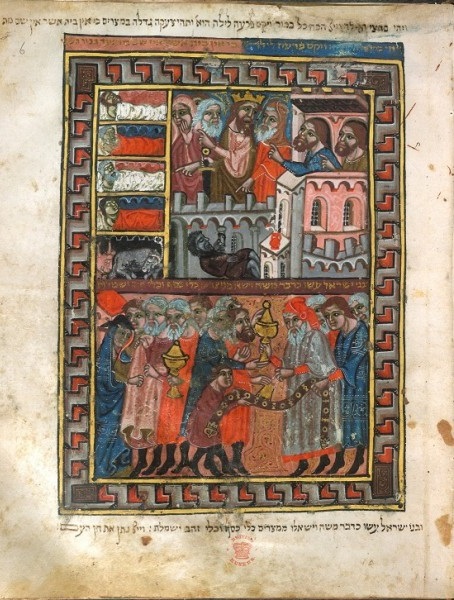Concordance Module #2
שאילת כלים
Divinely Sanctioned Duplicity?
Concordance Module #2

Despoiling Egypt / Brother Haggadah
1. Leaving Egypt with Great Wealth
- This module will examine Hashem's command to the nation: "וְשָׁאֲלָה אִשָּׁה מִשְּׁכֶנְתָּהּ... כְּלֵי כֶסֶף וּכְלֵי זָהָב", investigating the meaning of the root "שאל" and how this affects our reading of the instruction.
- לגרסה בעברית של יחידת לימוד זו, לחצו כאן.
- Let's start with the verses. Click here to access Shemot 3:20-22 in the Mikraot Gedolot.
- In these three verses, Hashem tells Moshe that when the nation leaves Egypt, they will not go empty-handed.
- Verse 22 explains how this will occur. How do you understand this verse? What questions might it raise?
2. Two Meanings of the Root "שאל"
- Commentators disagree about the meaning of the word "וְשָׁאֲלָה" and what the nation was commanded to do.
- Click on the word "וְשָׁאֲלָה" in verse 22 to access the One-Click Concordance and see the list of verses in which the word appears.
- Scan the first ten verses. What does the word mean in all of these verses?
- Now, scroll down to Melakhim II 6:5 (#112 in the concordance). What does the root mean here?
- Which of these meanings might present a moral issue if adopted in our verse? Why?
3. Predominant Usage of "שאל"
- From our survey of the verses, it seems that the root "שאל" can mean either 'to request' or 'to borrow'. How can we determne which of the two connotations is applicable in our verse?
- Once again, scan the concordance list of verses. Which of the above two meanings appears to be more prevalent?
- Is the relative frequency of the two meanings sufficient evidence to suggest that it takes on a particular meaning in our verse as well?
4. Concordance and Commentators: R. Hirsch
- Let's now see which of the two meanings of the verb "שאל" is preferred by various commentators.
- To return to the Mikraot Gedolot on Shemot 3:22 click on the x in the corner of the concordance pop-up.
- Use the gear icon in the middle of the top red bar to select which commentaries to display.
- Check "R. Hirsch" so that his commentary will now appear, and then press "Close" or click outside the dialog overlay to return to the Mikraot Gedolot.
5. Concordance and Commentators: R. Hirsch
- Which meaning of the root "שאל" does R. Hirsch adopt: to request or to borrow?
- What leads him to this conclusion?
- How does he explain why, nonetheless, many commentators naturally translate the word to mean borrow?
6. Concordance and Commentators: Rashbam
- See Rashbam's explanation of our verse.
- On which side of the debate does he stand?
- How might he explain why the Egyptians would want to give gifts to their despised slaves?
- Is Rashbam’s interpretation textually or polemically motivated or both?
- Which of his formulations might support each possibility?
- For English translation, press the E button at the top of Rashbam's commentary. The translation will appear under the Hebrew.
7. Concordance and Commentators: Shadal
- Compare the above explanations with Shadal's comments on the verse.
- Which explanation of the word does he adopt?
- How does he attempt to justify the deception? Do you agree with his justification?
- For English translation, press the E button at the top of Shadal's comments.
8. Bonus Concordance Work: "וְנִצַּלְתֶּם אֶת מִצְרָיִם"
- In Modern Hebrew, the word "לנצל" often means to "exploit" or "take advantage of". Is that what it means in our verse as well?
- Look back at our verse and click on the word "וְנִצַּלְתֶּם" to view the verb's entry in the One-Click Concordance.
- Scan the first few cases on the list. What possible meaning of the root emerges?
- How would you apply this meaning to our verse?
9. "וְנִצַּלְתֶּם אֶת מִצְרָיִם"
- Scroll down in the concordance list to Shemot 33:6 (#20).
- Click on the link next to the verse to see it in context. Based on the previous verse, what might the root mean in this case? [To close the full chapter pop-up and return to the concordance list, click on the x in the top corner of the pop-up.]
- Scroll down almost to the end of the list, to Divrei HaYamim II 20:25 (#204). What words in this verse are parallel to the word "וַיְנַצְּלוּ"? How would you translate it here?
- How might the different possibilities work with the various options for understanding שאילת כלים discussed above?
10. Additional Reading
- For elaboration on the ramifications of the various readings raised above, see: Reparations and Despoiling Egypt.
- For this topic in art, see: Despoiling Egypt in Art.
- For additional Pesach and Haggadah resources, see: Haggadah Home Page.
11. Further Options
- Return to the beginning of this module.
- Go to Module #1: פסח.
- Go to Module #3: ויעש להם בתים.
- Return to the Concordance Home Page.
- Access additional Interactive Learning Modules.